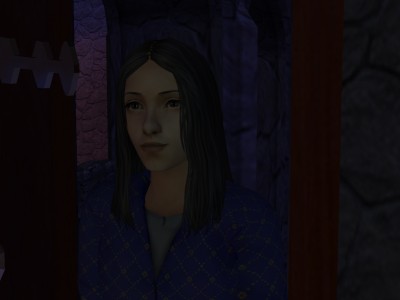
“Are you busy?” Dunstan asked dubiously. His father did not look busy: there was an empty sheet of parchment before him on the long desk, and beside it a nearly empty cup of wine.
“I’m not busy,” his father murmured. “I’m not certain that was the correct question to ask me, however.”
“Do you not want to see anybody?”
“I wasn’t thinking of seeing anybody, but if you wanted to see me, then you may come in.”
Dunstan hesitated, as he did in everything, but he finally decided to go inside and sit. His father’s study was dark but for the light of a fitful, smoky fire and of the colored glass lantern on the desk. The ruddy light on the one half of his face and the green light on the other made his father seem both angry and ill.
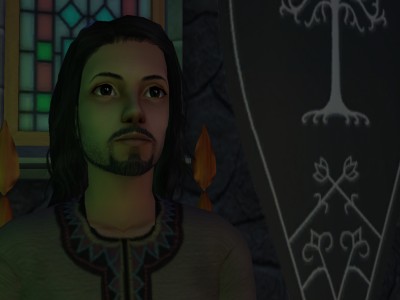
“I thought Egelric would be in here with you,” Dunstan said when his father did not speak.
“Egelric is not here tonight, Dunstan.”
“Is he at the castle?”
“He is at Raegiming.”
“What’s he doing there?” Dunstan cried in outrage.
“He and Leofric are friends. All the more so since he—became unhappy again.”
“But he’s your knight!”
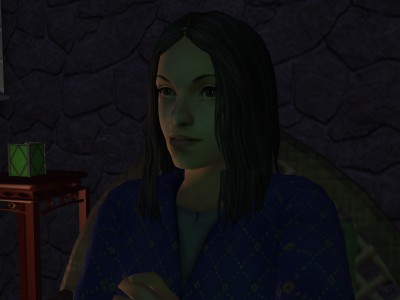
“Egelric is a grown man. I do not presume to tell him whom he may befriend. And Leofric has betrayed Egelric in no wise, to my knowledge.”
“But my mother was his lady.”
His father sighed. “She was no less his lady in Leofric’s arms, Dunstan. If you are come to speak of Leofric, then I believe that I am busy after all.”
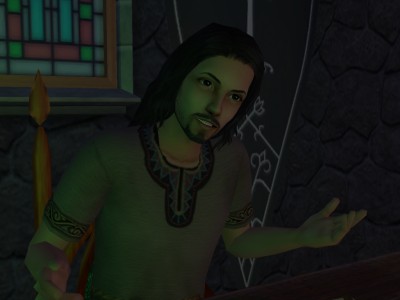
Dunstan flushed miserably. “No.”
Again his father sat silently, and again Dunstan could not bear it.
“Were you writing a poem?” he asked.
“I no longer write poetry.”
“I… thought you did.”
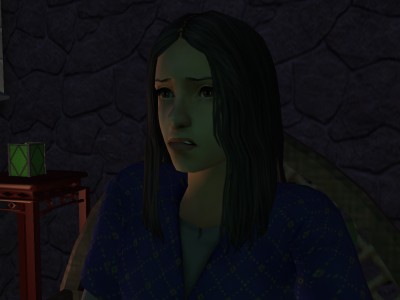
Dunstan was often allowed to read his father’s scribblings of the night before when he came to work in the mornings. They were not always finished, but they were certainly poems.
“If that’s what you call poetry,” his father said softly.
“I do. I like it.”
“Who knows but that I may succeed in expressing other men’s feelings even when I fall so short of my own,” his father shrugged. “I miss my mark and hit yours.”
Dunstan squirmed. “Are you ill?” he blurted.
“Ill?”
“Your voice…”
“What is the matter with my voice?”
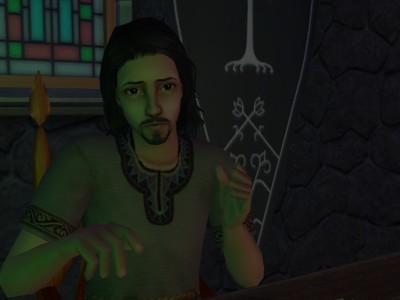
His father spoke softly, certainly, but there was something else… a sort of strain in it. Perhaps he had only been crying, but his eyes were dry and seemed clear in the green and ruddy lights.
“I don’t know… it sounds tight.”
“Ah! That’s it then. I have a sort of pain in my chest.”
“A pain?” Dunstan gasped. He had not been too young to remember his father’s great illness.
“Right… here,” his father said, and patted his hand over his chest for a moment before settling on a spot on the left side. “Right where a lady’s head ought to lie.”
“Where my mother laid her head,” Dunstan corrected.
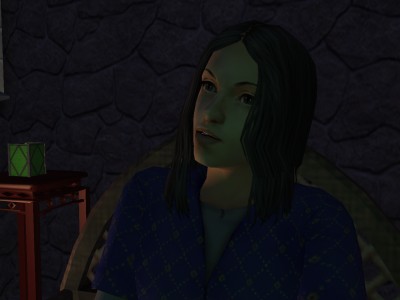
“A lady…” his father murmured, and then he sat back in his chair suddenly and stretched his legs out before him. “It’s an ache only a lady’s head can cure, Dunstan. Do you ever have those?”
“No…”
“You will. Your entire body will be aching for various parts of a lady’s. But this is a particularly difficult affliction. You can get a lady to do many curious things before you can get her to lie quietly with her head right here. And it must be a quiet head. If she’s plotting and scheming all the while, it won’t help.”
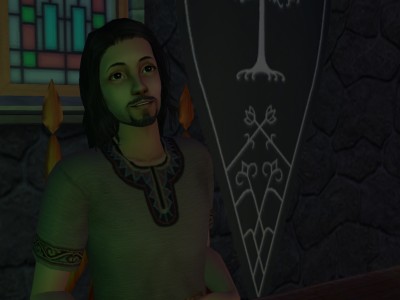
This was the sort of strange and half-comprehensible advice Dunstan’s father often gave him. He was aware that other boys’ fathers were rather more straightforward, and was thankful that he had the other boys to provide those details. Nevertheless, he listened carefully to his father and thought over everything he said.
As if thoughts could be read, his father said, “Dunstan, I shall give you some very important advice. On your wedding night, I want you to lie down on the left side of the bed—that is to say, the right side, if you are lying down. And every night thereafter. I didn’t think of it until it was too late, and it is one of my greatest regrets.”
Dunstan found this advice utterly incomprehensible, unless there was something about men and women that even the other boys had not told him.
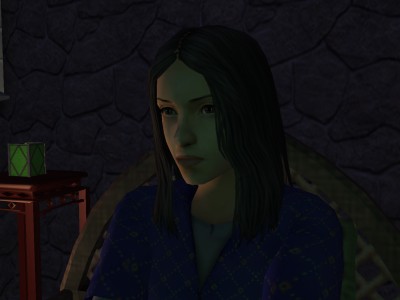
“Why?” he asked.
“Then your wife will come to lay her head upon your heart. Right here.” He patted his chest again. “If you sleep on the right side, she will lay her head here,” he said and patted the other side, “where there’s nothing. Only empty air. I figured it out too late. Your mother was already sleeping on the left side, and you know how stubborn and set in her ways she could be. Not that I asked her to switch sides.”
“Why didn’t you?”
“Another great regret!” he sighed. “I thought she would think it foolish if I told her why. She would have laughed, but I suppose she would have done it. And she would have come to lay her head upon my heart, and secretly delighted in it, too. Because I had told her. But I did not.”
Now, it seemed, the strain had become too much, and his voice simply broke.
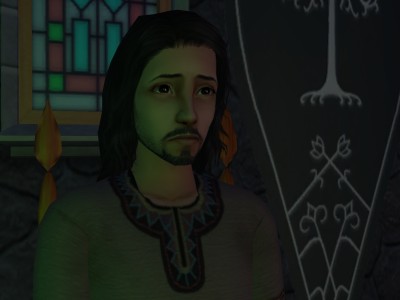
“It is another piece of advice,” his father continued hoarsely. “Never miss an occasion to tell or show a woman how much you love her, even if you think you will look like a fool. You never stop looking like a fool as long as you love, anyway. And she may laugh at you. But she will keep all these things, and ponder them in her heart. Let me show you something.”
His father rose and blew out the lamp, and Dunstan followed him silently up to his bedroom. He scarcely ever entered that room since his mother’s death, for his father never spent time in it but to sleep. As far as Dunstan knew, no one had sat on his mother’s couch in two years.
There was no fire in his father’s room, and for light he lit a couple of the green glass lamps he favored. Now he looked only ill.
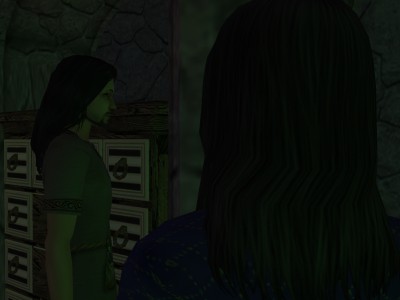
His father opened a drawer in the tall chest and pulled out an old, red leather bag that was hidden under a pile of blankets. Out of the bag he took a small book that looked older still, with a scuffed and spotted cover that had once been fine.
“This is your little Welsh grandmother’s Psalter. She had it in her pocket when she went to church on that Sunday your grandfather carried her away. That, and the key to a home that she never saw again, were the only things she was able to take with her. And of course it went to your mother after her, but your mother was a very naughty girl and wrote in her books, as you will see.”

He gave the book to Dunstan, but he left one hand on it, clamping it shut.
“When I met your mother, I was so in love with her that I didn’t even mind looking foolish, and I wrote poem after poem for her until with my foolishness I made her break her vow not to laugh. What I did not know was that she had been copying them into her Psalter as they arrived. She said it was her own Song of Songs.”
The book was trembling under his father’s hand until at last he let it go.
“But she did not tell me this for more than ten years. Not until the night my Lady Margaret was born, and she believed she would die. Now I wonder how many times in those ten years I wanted to tell her or show her how I loved her, and did not, because I feared I would look foolish? And all the while she loved my foolishness? It is a bitter thought, is it not?”
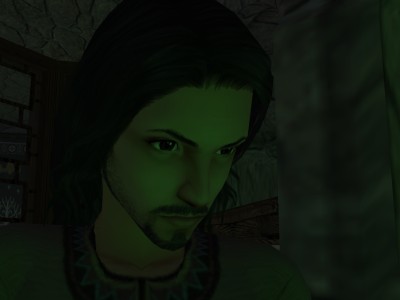
“But she knew you loved her,” Dunstan said, and immediately thought the phrase utterly unworthy of everything that had preceded it. His father loved and lived in a higher sphere that Dunstan knew he would never attain. Indeed, it were foolish to try.
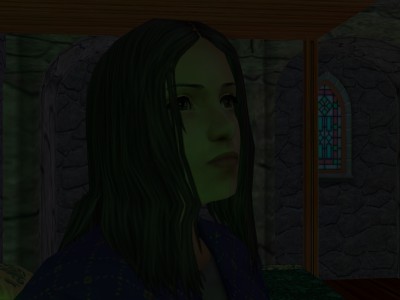
Apparently his father found the remark unworthy of comment.
“You may read what I wrote,” he said, “though I think it is of little importance beside the lesson it has permitted me to demonstrate. But do not tell anyone of this book. She wanted me to give it to Gwynn, but it isn’t time.”
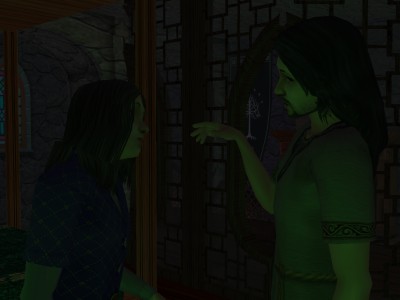
Dunstan nodded.
“Now,” his father sighed and sat on the left side of the bed. In the green light he looked very old and very ill. “I shall ask you to leave me. I am feeling very lonely. And so I wish to be alone.”
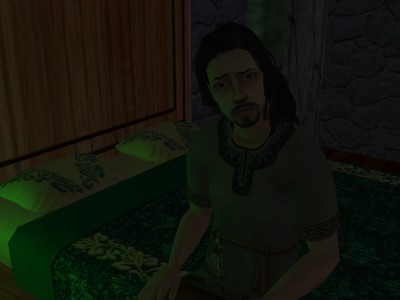





I have tears in my eyes all over again. Alred...